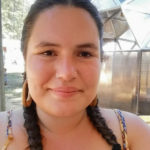Through our harm reduction portfolio, AIDS United engages in grant-making, technical assistance and advocacy to reduce the health, psychosocial and socioeconomic disparities experienced by people who use drugs.
Our harm reduction grants and initiatives support evidence-based and community-driven approaches to prevent the transmission of both HIV and viral hepatitis, reduce injection-related injuries, increase overdose prevention and reversal efforts, and connect people who use drugs to comprehensive prevention, treatment and support services.
If you need to get in contact with the team, reach out to harmreduction@aidsunited.org and we’ll be in touch.

Annie Benjamin
Program associate
Annie (she/her/hers) is passionate about advancing the rights and health of people who use drugs and preventing overdose deaths through evidence-based, person-centered policy approaches.
Annie received her B.S. in sociology at Ithaca College, where her passion for harm reduction was born during an internship at a syringe exchange program her senior year. She stayed on at the syringe exchange program after graduating, working as a harm reduction specialist. This work inspired her to pursue her MS in social work at Columbia University. While at Columbia, Annie pursued the policy track where she focused on drug policy reform and harm reduction, conducting fieldwork at St. Ann’s Corner of Harm Reduction in the South Bronx, and the Open Society Foundations Global Drug Policy program.
Outside of work, Annie loves doing crossword puzzles, reading, and showing everyone she knows pictures of her dog, Frankie. She is a proud New Jerseyan born and raised, and she currently resides in Hoboken, NJ.

Angel Gomez
Program manager
Angel Gomez (she/her) is a program manager with AIDS United. She was born and raised in rural Northern California, living in Chico for a majority of the past 25 years. Angel has held many positions in community organizations over the years ranging from food justice, environmental activism, and harm reduction.
She was one of the co-founders of the Northern Valley Harm Reduction Coalition in Butte County, CA that has received national attention for the persistence the group has shown in serving their community despite many foes. Angel also worked for Northern Valley Indian Health to help build opioid programs serving natives in 5 rural counties, developing medicated assisted treatment programs as well as opioid related training and programs for native communities. She is excited to bring her knowledge and skills to support harm reduction on a larger scale.
Outside of work, Angel rescues hard to adopt dogs and cats. She usually adopts animals who are elderly, sick, have behavioral issues, or were in shelters for long periods of time. She also enjoys going to concerts and music festivals, often volunteering with backstage hospitality.

Mark Lockwood
Program manager
Mark serves as the program manager on the Harm Reduction team where he oversees the Expanding Syringe Services Programs (SSPs) Capacity to Respond to COVID-19 grant portfolio. In his role, Mark leads technical assistance and program development needs to community-based organizations and Syringe Services Programs (SSPs) on harm reduction strategies, COVID-19 vaccination expansion, and comprehensive systems of care. Prior to joining AIDS United, Mark has worked in various capacities within the harm reduction movement, ranging from direct services to governmental public health, at the intersections of capacity building, program management, and community-based research. He also was a community organizer with DECRIMNOWDC, a collective of Brown and Brown sex workers, organizers, and allies, where he helped develop and strategize around sex worker rights and harm reduction policy at the local level in Washington, D.C.
Mark is truly committed to mobilizing the health, dignity, and rights of communities impacted by racialized drug policies and anti-sex worker policies. He received a B.A. in Women’s & Gender Studies from Rutgers University – New Brunswick and his M.A. in Performance Studies from New York University. He is currently pursuing his PhD in American Studies at the University of Maryland, College Park. At Maryland, Mark is writing a dissertation that critically explores the history and sexual representations of Black male sex workers in the gay adult entertainment industry.
In his spare time, he enjoys bottomless brunch, traveling, quality time with his friends, and solo movie dates. He’s currently based in Dallas, Texas with his partner, Jared, and imaginary dog, Remi.

Jessica Martinez
Program manager
Jessica Kiaraliza Martinez is a Harm Reductionist who specializes in Urban, Suburban and Rural Stimulant Use. Jessica studied at George Washington University where she received her Bachelors in Arts with a major in American Studies and a minor in Political Science. Her focuses in American Studies included health care inequities, racism, criminalization, as well as the War on Drugs and the repercussions of “Just Say No” messaging. Jessica began a program in Washington D.C. to assist those in the chemsex community known as the, “Methamphetamine Services Program ” at HIPS. Jessica created a network of peer exchangers, and educators who would go out into the community to specifically target polysubstance use and stimulant use. Identifying key stakeholders to expand harm reduction access to people in and outside of D.C.
Jessica worked on grassroots community organizing for the DC Chem Sex Community. Expanding upon the Meth Services Program, Jessica began connecting with people nationally to address the issue of polysubstance use, chemsex, and the need for equitable access to harm reduction services for these populations. Jessica has been featured in Filter Mag, and VICE advocating for sex workers, drug users, and people living with HIV/AIDS. Jessica has traveled and engaged with Meth users all around the nation.
Recently Jessica moved on from direct service work to consulting at NASTAD’s National TA Center to train Syringe Service Providers on best practices when beginning an SSP. These sessions included safer injection practices and general harm reduction techniques such as motivational interviewing, cultural competency, and discussing unconscious bias of drug users. These trainings have delved into common drugs and routes of administration, as well as wound care, and brainstorming creative solutions for rural and suburban communities.
Jessica currently resides in Denver, Colorado, where she works to assist drug users in her local community and learn more about rural harm reduction methods and best practices. Jessica is an avid video gamer, hiker, and chef.

Christine Rodriguez
Senior program manager
Christine Rodriguez (she/her) is a dyed-in-the-wool harm reductionist, bringing to her senior program manager role 15 years’ of experience in drug user health across HIV, viral hepatitis, and overdose prevention. She has worked in varied roles across policy advocacy, capacity building, training and direct service in the public and nonprofit sectors.
Rodriguez is deeply committed to supporting harm reduction across the U.S. and believes the leadership of people who use drugs is essential to ending the syndemic of HIV, viral hepatitis and overdose. She earned her Master of Public Health from the University of California, Berkeley, and her Bachelor of Arts in American Studies, specializing in sociology, from Pomona College.
In her free time, Rodriguez loves a good novel, travelling (under safer circumstances), her opinionated puppy Tina, aunting her little nibblings, and Zooming with far-flung friends and family.

Taylor Sabol
Program associate
Taylor (she/her) is a Harm Reduction program associate at AIDS United. Taylor received her B.S. in Public Health at American University. She is a current Masters of Public Health student at George Washington University. Her love for harm reduction began during her time working at the Philadelphia Department of Public Health on their overdose prevention programs. Taylor is passionate about centering the lived experiences of people who use drugs in public health programs and policy.
Outside of work, Taylor likes to frequent different coffee shops in the city, attend concerts, and read.

